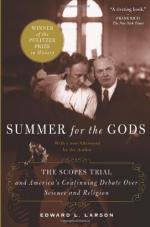
|
| Name: _________________________ | Period: ___________________ |
This quiz consists of 5 multiple choice and 5 short answer questions through Part 1, Chapter 3 In Defense of Individual Liberty.
Multiple Choice Questions
1. After the war, the National Civil Liberties Bureau changes its name to what to reflect its new focus defending labor union activists?
(a) American Civilian Liberties Unity (ACLU).
(b) American Civil Liberties Union (ACLU).
(c) American Civil Liberty Unit (ACLU).
(d) American Civilian Legal Union (ACLU).
2. The ACLU defends teachers fired for opposing World War I and fights school systems over what mandatory exercises?
(a) Physical.
(b) Bible reading.
(c) Patriotic.
(d) Religious.
3. Darrow is likely the most famous U.S. trial lawyer by the 1920s, defending many famous clients including what Socialist labor leader in the late 1890s?
(a) Charles H. Corregan.
(b) Charles Matchett.
(c) Simon Winn.
(d) Eugene V. Debs.
4. Over a century before the Piltdown skull find, who argues that environmental changes may affect biological makeup, and changes pass down to offspring?
(a) Georges Cuvier.
(b) Chevalier de Lamarck.
(c) Charles Dawson.
(d) Charles Darwin.
5. Larson's introduction serves as a preview of the Scopes trial and issues it raises for whom?
(a) American society.
(b) School administrators.
(c) Teachers.
(d) Tennessee society.
Short Answer Questions
1. What do modernists argue matters regarding the accounts within biblical scriptures?
2. Who spurs the idea that science and religion conflict, and deny a growing consensus among theologians and scientists by the 1900s?
3. Larson says the defense strategy of calling a prosecutor to the stand to testify as a hostile witness is what?
4. What else pushes evolution to the forefront of public debate in the early 1920s?
5. What question does the Scopes trial rest on?
|
This section contains 321 words (approx. 2 pages at 300 words per page) |

|




